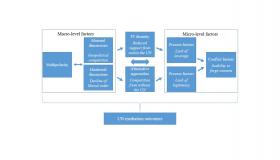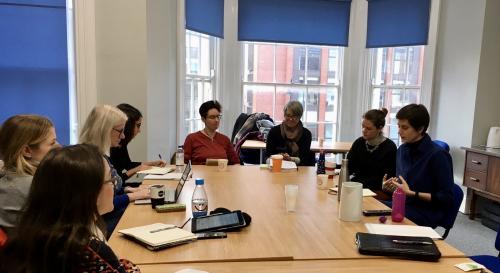
Breadcrumbs navigation
Wind of change: peacemaking in a multipolar world order
Failures to bring armed conflicts, such as in Syria, Libya, or most recently Ukraine, to a negotiated agreement have led to a questioning of the UN’s role in peacemaking. In her new Review of International Studies (RIS) article, Sara Hellmüller explains how a macro-level perspective can improve our analysis of contemporary mediation processes.
Adding a macro-level perspective
The existing literature predominantly explains the outcomes of international mediation efforts by focusing on micro-level aspects, examining either process factors in terms of the characteristics of the mediation itself or conflict factors in terms of the characteristics of the conflict context. Both play a crucial role in understanding mediation. However, in my RIS article, I argue that these micro-level factors need to be understood in light of macro-level factors related to the world political environment in which mediation processes take place.
While it is a truism that world politics affect peacemaking, the exact way in which changing world orders influence mediation outcomes has received relatively little scholarly attention. Yet, such an analysis is particularly important in light of the current tectonic shifts in the prevailing world order from unipolarity to multipolarity, with the US no longer being the sole superpower, and other actors, such as China and Russia, playing increasingly important roles in world politics. I argue that without an analysis of how such macro-level factors influence mediation, we risk neglecting the structural environment in which mediation takes place and may therefore have an incomplete view or even misinterpret what determines mediation outcomes.
In my RIS article, I fill this gap by examining the mechanisms through which macro- and micro-level factors interact and influence mediation outcomes. To do so, I take UN mediation in Syria from 2012 to 2018 as a case study. I draw on an analysis of 41 in-depth semi-structured interviews as well as a review of press statements and UN Security Council (UNSC) briefings by the three UN Special Envoys for Syria appointed as mediators during the period covered.
The argument in a nutshell
In the article, I show how macro-level factors related to world politics interact with micro-level factors related to the mediation process and conflict context and demonstrate how they jointly produce mediation outcomes (see figure below). I argue that at the macro-level, multipolarity has both material and ideational dimensions that manifest themselves in a resurgence of geopolitical competition and a decline of the liberal normative order. These macro-level factors affect UN mediation in two main ways. First, geopolitical competition leads to increased disunity among the permanent five members (P5) of the UNSC. This often results in reduced support to UN mediators from within the UN. Second, the decline of the liberal normative order has allowed for alternatives to the liberal peacemaking approach to emerge with new actors offering to host or mediate talks. This has led to competition to UN mediation from without the UN. In the case of Syria, this lack of internal support paired with outside competition influenced micro-level factors as the UN mediators were unable to garner the necessary leverage and legitimacy to forge the parties’ consent to find a negotiated solution.

Contributions
The article makes two main contributions. First, it provides a systematic analysis of the link between world politics and UN mediation by complementing micro-level explanations for UN mediation outcomes with a macro-level perspective. Second, it contributes to a better understanding of UN mediation, and particularly in Syria, which has become a test case for UN legitimacy in contemporary peacemaking. Overall, the article contributes to reflections on how the UN can keep its relevance in peacemaking in a shifting world order.
The article constitutes a first attempt at shedding light on the mechanisms through which macro- and micro-level factors interact in mediation. It will ideally encourage other studies on such factors to provide a complement to the current focus on micro-level aspects in mediation research. This additional layer of analysis is all the more important given its direct relevance to mediation practice. Indeed, a neglect of the structural world political context in which mediation takes place may result in ineffective or counterproductive policy recommendations. Scholars therefore need to provide sound insights on the implications of multipolarity for mediation in order to help the UN maintain its role in peacemaking in a shifting world order.
Want to know more? You can read Sara's full article - Peacemaking in a shifting world order: A macro-level analysis of UN mediation in Syria - at DOI: https://doi.org/10.1017/S026021052200016X
BISA members receive access to RIS (and to our other journal European Journal of International Security) as a benefit of membership. To gain access, log in to your BISA account and scroll down to the 'Membership benefits' section. If you're not yet a member join today.


